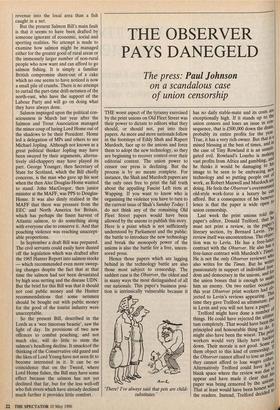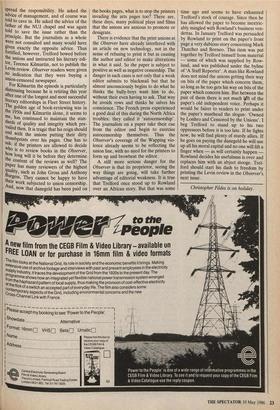THE OBSERVER PAYS DANEGELD
The press: Paul Johnson
on a scandalous case of union censorship
THE worst aspect of the tyranny exercised by the print unions on Old Fleet Street was their power to dictate to editors what they should, or should not, put into their papers. As more and more nationals follow in the footsteps of Eddy Shah and Rupert Murdoch, face up to the unions and force them to adopt the new technology, so they are beginning to recover control over their editorial content. The union power to censor our press is declining. But the process is by no means complete. For instance, the Shah and Murdoch papers are the only ones free to print the full truth about the appalling Fascist Left riots at Wapping. If you want to know who is organising the violence you have to turn to the current issue of Shah's Sunday Today: I do not think any of the remaining Old Fleet Street papers would have been allowed by the unions to publish this story. Here is a point which is not sufficiently understood by Parliament and the public: the battle to introduce the new technology and break the monopoly power of the unions is also the battle for a free, uncen- sored press.
Hence those papers which are lagging behind in the technology battle are also those most subject to censorship. The saddest case is the Observer, the oldest and in many ways the most distinguished of all our nationals. This paper's business posi- tion is intrinsically vulnerable because it 'There! I've always said that pets are child- substitutes.' has no daily stable-mate and its costs arc exceptionally high. If it stands up to the union censors and loses an issue in eon' sequence, that is £500,000 down the drain, probably its entire profits for the Year' True, it has a very rich owner. But that IS mixed blessing at the best of times, and I. the case of Tiny Rowland it is an gated evil. evil. Rowland's Lonrho is making vast profits from Africa and gambling, all.d he thinks it would be damaging to his image to be seen to be embracing new, technology and so putting people out oi work, as Robert Maxwell and Murdoch are, doing. He feels the Observer's overmanneu old-style work-force is a luxury he Can afford. But a consequence of his benevn" lence is that the paper is wide °Pen t° union censorship. Last week the print unions told die paper's editor, Donald Trelford, that he must not print a review, in the paP,er,s, literary section, by Bernard Levin. review itself was uncontentious. The oblec- tion was to Levin. He has a free-lanee contract with the Observer. He also has 3 free-lance contract with Murdoch's Tinles' He is not the only Observer reviewer w.11°,. also writes for the Times. But he write' passionately in support of individual free: dom and democracy in the unions, and fr: the union bosses that is enough to In.alts him an enemy. On two earlier occasi°11b, this year Observer print workers hacis jected to Levin's reviews appearing. time they gave Trelford an ultimatuni: F- in Levin and you will not have a paper. f Trelford might have done a number 0, things. He could have rejected the Ole turn completely. That would have been it principled and honourable thing to dn.. t might also have been the wisest. The quid workers would very likely have hac'eof down. Their morale is not good. Soul! f f them object to this kind of censorship. e"' the Observer cannot afford to lose an issur they cannot afford to lose wages eltb,e; Alternatively Trelford could have let to blank space where the review was clue,,is appear and have made it clear tha! paper was being censored by the tini°11.th That at least would have been honest WI.0 the readers. Instead, Trelford decided Spread the responsibility. He asked the advice of management, and of course was told to cave in. He asked the advice of the father of the NUJ chapel and was again told to save the issue rather than the Principle. But the journalists as a whole were not consulted and many would have given exactly the opposite advice. Thus fortified, however, Trelford bowed before the unions and instructed his literary edi- tor, Terence Kilmartin, not to publish the Levin review. Observer readers were given no. indication that they were buying a union-censored newspaper. For Kilmartin the episode is particularly distressing because he is retiring this year after one of the longest and most successful literary editorships in Fleet Street history. The golden age of book-reviewing was in the 1950s and Kilmartin alone, it seems to me, has continued to maintain the stan- dards of quality and integrity which pre- vailed then. It is tragic that his reign should end with the unions putting their dirty thumbprints over his pages. One has to ask: if the printers are allowed to decide who is to review books in the Observer, how long will it be before they determine the content of the reviews as well? The Paper has many reviewers of the highest quality, such as John Gross and Anthony tBhur.gess. They cannot be happy to have eir work subjected to union censorship. And, now that danegeld has been paid on the books pages, what is to stop the printers invading the arts pages too? There are, these days, many political plays and films that the unions are anxious to promote or denigrate.
There is evidence that the print unions at the Observer have already interfered with an article on new technology, not in the sense of refusing to print it but in causing the author and editor to make alterations in what it said. So the paper is subject to positive as well as negative censorship. The danger in such cases is not only that a weak editor submits to blackmail but that he almost unconsciously begins to do what he thinks the bully-boys want him to do, without their even having to ask. That way he avoids rows and thinks he salves his conscience. The French press experienced a good deal of this during the North Africa troubles: they called it `autocensorship'. The journalists on a paper take their cue from the editor and begin to exercise autocensorship themselves. Thus the Observer's coverage of the Wapping vio- lence already seems to be reflecting the union line, with no need for the printers to form up and browbeat the editor. A still more serious danger for the Observer is that its proprietor, seeing the way things are going, will take further advantage of editorial weakness. It is true that Trelford once stood up to Rowland over an African story. But that was some time ago and seems to have exhausted Trelford's stock of courage. Since then he has allowed the paper to become inextric- ably mingled with Rowland's business ven- dettas. In January Trelford was persuaded by Rowland to print on the paper's front page a very dubious story concerning Mark Thatcher and Borneo. This item was put together by Trelford himself from material — some of which was supplied by Row- land, and was published under the byline of 'A Staff Reporter'. A man like Rowland does not mind the unions getting their way on bits of the paper which concern them, so long as he too gets his way on bits of the paper which concern him. But between the pair of them there is not much l/ft of the paper's old independent voice. Perhaps it would be fairer to readers to print under the paper's masthead the slogan: 'Owned by Lonhro and Censored by the Unions'. I beg Trelford to stand up to his two oppressors before it is too late. If he fights now, he will find plenty of sturdy allies. If he goes on paying the danegeld he will use up all his moral capital and no one will lift a finger when — as will certainly happen — Rowland decides his usefulness is over and replaces him with an abject stooge. Trel- ford should start his dash to freedom by printing the Levin review in the Observer's next issue.
Christopher Fildes is on holiday.



























































 Previous page
Previous page